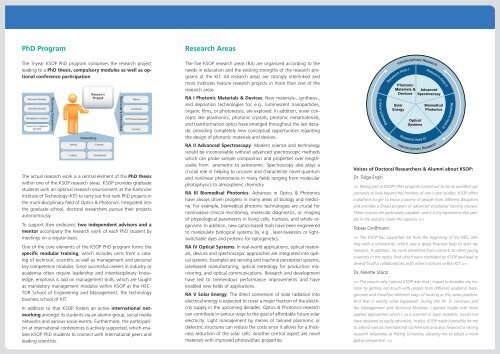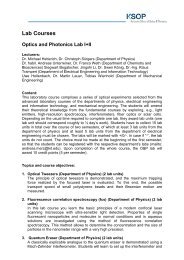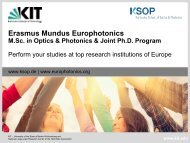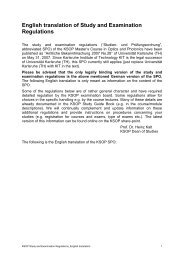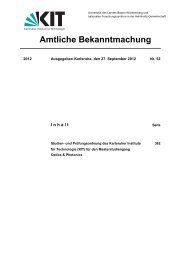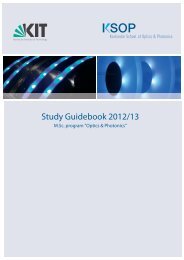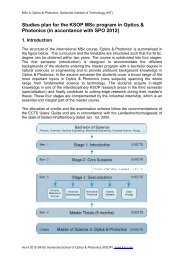Information Flyer - Karlsruhe School of Optics & Photonics - KIT
Information Flyer - Karlsruhe School of Optics & Photonics - KIT
Information Flyer - Karlsruhe School of Optics & Photonics - KIT
You also want an ePaper? Increase the reach of your titles
YUMPU automatically turns print PDFs into web optimized ePapers that Google loves.
PhD Program<br />
The 3-year KSOP PhD program comprises the research project<br />
leading to a PhD thesis, compulsory modules as well as optional<br />
conference participation.<br />
The actual research work is a central element <strong>of</strong> the PhD thesis<br />
within one <strong>of</strong> the KSOP research areas. KSOP provides graduate<br />
students with an optimal research environment at the <strong>Karlsruhe</strong><br />
Institute <strong>of</strong> Technology (<strong>KIT</strong>) to carry out first rank PhD projects in<br />
the multi-disciplinary field <strong>of</strong> <strong>Optics</strong> & <strong>Photonics</strong>. Integrated into<br />
the graduate school, doctoral researchers pursue their projects<br />
autonomously.<br />
To support their endeavor, two independent advisors and a<br />
mentor accompany the research work <strong>of</strong> each PhD student by<br />
meetings on a regular basis.<br />
One <strong>of</strong> the core elements <strong>of</strong> the KSOP PhD program forms the<br />
specific modular training, which includes units from a catalog<br />
<strong>of</strong> technical, scientific as well as management and personal<br />
key competence modules. Since successful careers in industry or<br />
academia <strong>of</strong>ten require leadership and interdisciplinary knowledge,<br />
emphasis is laid on management skills, which are taught<br />
as mandatory management modules within KSOP at the HEC-<br />
TOR <strong>School</strong> <strong>of</strong> Engineering and Management, the technology<br />
business school <strong>of</strong> <strong>KIT</strong>.<br />
In addition to that KSOP fosters an active international networking<br />
amongst its students via an alumni group, social media<br />
networks and various social events. Furthermore, the participation<br />
at international conferences is actively supported, which enables<br />
KSOP PhD students to connect with international peers and<br />
leading scientists.<br />
Research Areas<br />
The five KSOP research areas (RA) are organized according to the<br />
needs in education and the existing strengths <strong>of</strong> the research programs<br />
at the <strong>KIT</strong>. All research areas are strongly interlinked and<br />
most institutes feature research projects in more than one <strong>of</strong> the<br />
research areas.<br />
RA I Photonic Materials & Devices: New materials-, synthesis-,<br />
and deposition technologies for, e.g., luminescent nanoparticles,<br />
organic films, or photoresists. are explored. In addition, novel concepts<br />
like plasmonics, photonic crystals, photonic metamaterials,<br />
and transformation optics have emerged throughout the last decade,<br />
providing completely new conceptual opportunities regarding<br />
the design <strong>of</strong> photonic materials and devices.<br />
RA II Advanced Spectroscopy: Modern science and technology<br />
would be inconceivable without advanced spectroscopic methods<br />
which can probe sample composition and properties over lengthscales<br />
from anometric to astronomic. Spectroscopy also plays a<br />
crucial role in helping to uncover and characterize novel quantum<br />
and nonlinear phenomena in many fields ranging from molecular<br />
photophysics to atmospheric chemistry.<br />
RA III Biomedical <strong>Photonics</strong>: Advances in <strong>Optics</strong> & <strong>Photonics</strong><br />
have always driven progress in many areas <strong>of</strong> biology and medicine.<br />
For example, biomedical photonic technologies are crucial for<br />
noninvasive clinical monitoring, molecular diagnostics, or imaging<br />
<strong>of</strong> physiological parameters in living cells, humans, and whole organisms.<br />
In addition, new optics-based tools have been engineered<br />
to manipulate biological systems by, e.g., laser-tweezers or lightswitchable<br />
dyes and proteins for optogenetics.<br />
RA IV Optical Systems: In real-world applications, optical materials,<br />
devices and spectroscopic approaches are integrated into optical<br />
systems. Examples are sensing and machine perception systems,<br />
laserbased manufacturing, optical metrology for production monitoring,<br />
and optical communications. Research and development<br />
have led to tremendous performance improvements and have<br />
enabled new fields <strong>of</strong> applications.<br />
RA V Solar Energy: The direct conversion <strong>of</strong> solar radiation into<br />
electrical energy is expected to cover a major fraction <strong>of</strong> the electricity<br />
supply in the upcoming decades. <strong>Optics</strong> & <strong>Photonics</strong> research<br />
can contribute in various ways to the goal <strong>of</strong> affordable future solar<br />
electricity: Light management by means <strong>of</strong> tailored plasmonic or<br />
dielectric structures can reduce the costs since it allows for a thickness<br />
reduction <strong>of</strong> the solar cells. Another central aspect are novel<br />
materials with improved photovoltaic properties.<br />
Research Area V Research Area I<br />
Voices <strong>of</strong> Doctoral Researchers & Alumni about KSOP:<br />
Dr. Tolga Ergin<br />
><br />
Tobias Großmann<br />
><br />
Dr. Ninette Stürzl<br />
Interdisciplinary Research<br />
Research Area II Research Area III<br />
Photonic<br />
Materials & Advanced<br />
Devices Spectroscopy<br />
Solar<br />
Energy<br />
Optical<br />
Systems<br />
Research Area IV<br />
Biomedical<br />
<strong>Photonics</strong><br />
Interdisciplinary Research<br />
>
KSOP Pr<strong>of</strong>ile Key Data & Benefits<br />
<strong>Optics</strong> & <strong>Photonics</strong> are key technologies <strong>of</strong> the 21st century.<br />
They form, e.g., the basis for today’s optical communications,<br />
environmental sensing, biomedical diagnostics in<br />
the life sciences, energy efficient lighting and solar energy<br />
harvesting. In this context the <strong>Karlsruhe</strong> <strong>School</strong> <strong>of</strong> <strong>Optics</strong> &<br />
<strong>Photonics</strong> (KSOP) was founded in 2006 as the first graduate<br />
school in <strong>Optics</strong> & <strong>Photonics</strong> within the German “Excellence<br />
Initiative“ at the <strong>Karlsruhe</strong> Institute <strong>of</strong> Technology (<strong>KIT</strong>). The<br />
excellence status was renewed for another five years after a<br />
successful evaluation by international experts in 2012.<br />
The KSOP provides a multidisciplinary environment for firstclass<br />
research and education as well as for the generation<br />
<strong>of</strong> knowledge and innovation in <strong>Optics</strong> & <strong>Photonics</strong>. Comprising<br />
both a MSc and a PhD program as well as Erasmus<br />
Mundus programs, the KSOP educational concept is designed<br />
to qualify graduates for accelerated careers at world<br />
leading academic institutions and in high-technology industries.<br />
KSOP PhD program facts*:<br />
KSOP Pr<strong>of</strong>essors: 19<br />
KSOP Junior Research Group Leaders & Staff Scientists: 12<br />
KSOP Doctoral Researchers: 80<br />
KSOP Alumni: 55<br />
Funding Partner: German Research Foundation (DFG)<br />
Host University: <strong>Karlsruhe</strong> Institute <strong>of</strong> Technology (<strong>KIT</strong>)<br />
* Nov 2012<br />
KSOP Graduate <strong>School</strong><br />
MSc Program in <strong>Optics</strong> & <strong>Photonics</strong><br />
(Master <strong>of</strong> Science)<br />
PhD Program in <strong>Optics</strong> & <strong>Photonics</strong><br />
(Dr. rer. nat. or Dr.-Ing.)<br />
MSc degree <strong>of</strong><br />
another <strong>School</strong><br />
• 3-years PhD Program<br />
• Modular Training<br />
• Supervision & Mentoring Concept<br />
• International Networking<br />
Target Group & Application<br />
The application for the KSOP PhD program is ongoing without<br />
any deadlines. There are two possible pathways to the<br />
graduate program:<br />
• Direct entrance with a suitable international masters/<br />
diploma degree<br />
• Recruitment from KSOP MSc program graduates<br />
Due to the excellent research opportunities in <strong>Karlsruhe</strong> the<br />
KSOP looks upon a high number <strong>of</strong> applications from other<br />
national and international universities. The selection <strong>of</strong> the<br />
candidates after application is based on the positive statement<br />
<strong>of</strong> the prospective advisors and approval by the executive<br />
board <strong>of</strong> the KSOP. PhD candidates are either financed<br />
from KSOP scholarships or from other financial resources.<br />
<strong>Karlsruhe</strong> <strong>School</strong> <strong>of</strong> <strong>Optics</strong> and <strong>Photonics</strong> (KSOP)<br />
<strong>Karlsruhe</strong> Institute <strong>of</strong> Technology (<strong>KIT</strong>)<br />
Schlossplatz 19, 76131 <strong>Karlsruhe</strong> (Germany)<br />
Phone: +49 721 608 47880<br />
Fax: +49 721 608 47882<br />
E-Mail: phd.info@ksop.de<br />
Web: www.ksop.de<br />
Find us on Facebook!<br />
Managing Director:<br />
KSOP Coordinator:<br />
PhD Program Manager:<br />
Dr.-Ing. Judith Elsner<br />
Pr<strong>of</strong>. Dr. Ulrich Lemmer<br />
Denica Angelova<br />
International PhD Program<br />
in <strong>Optics</strong> & <strong>Photonics</strong><br />
<strong>Karlsruhe</strong> school <strong>of</strong> optics & photonics<br />
www.ksop.de<br />
<strong>KIT</strong> - Universität des Landes Baden-Württemberg und nationales Großforschungszentrum in der Helmholtz-Gemeinschaft


